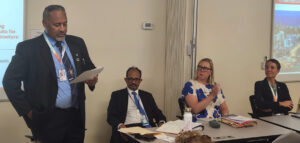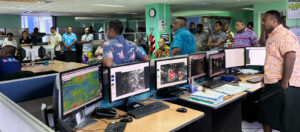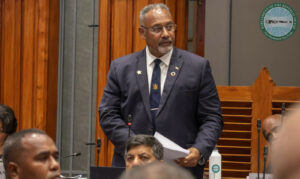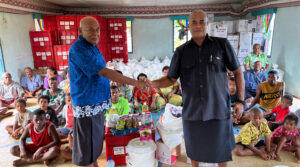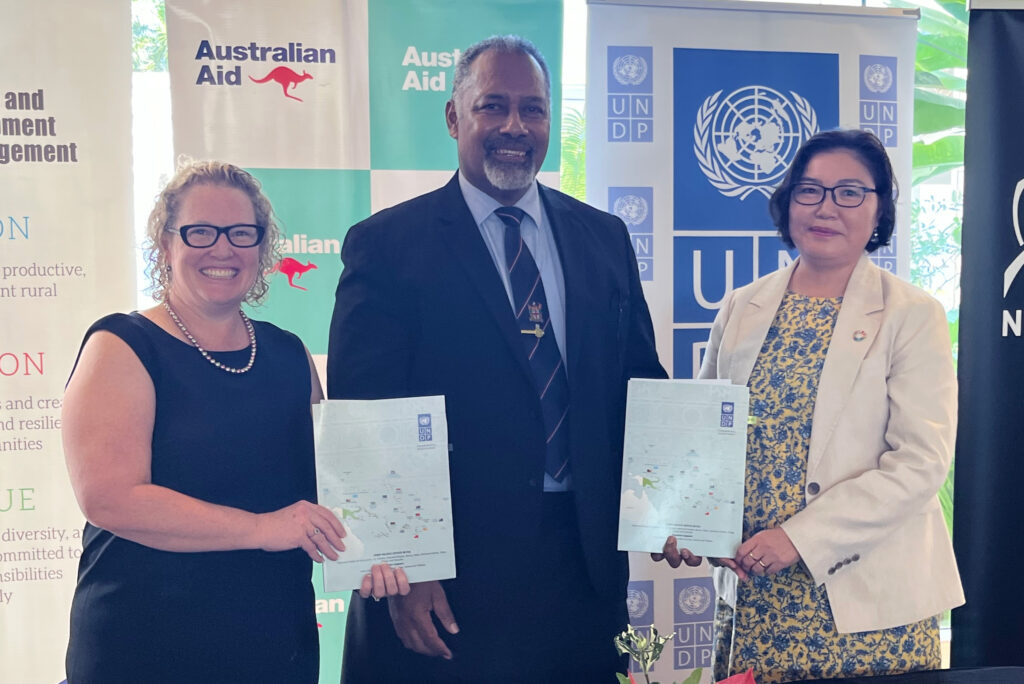
Caption: From left – Australian Deputy High Commissioner Ms. Clair McNamara, Minister for Rural and Maritime Development and Disaster Management Hon. Sakiasi Ditoka, and the UNDP Pacific Resident Representative Ms. Munkhtuya (Tuya) Altangerel after the signing ceremony in Suva earlier this month.
9 May 2024, Suva, Fiji – The Ministry of Rural and Maritime Development and Disaster Management (MRMDDM) of Fiji and the United Nations Development Programme (UNDP) Pacific Office in Fiji have reaffirmed their strategic partnership to ensure community development is sustainable for generations to come.
The FJD 1.5 million agreement signed today by the Honourable Sakiasi Ditoka, Minister for Rural and Maritime Development and Disaster Management and UNDP Resident Representative, Munkhtuya Altangerel will witness the scaling of approaches to risk-informing community infrastructure in Fiji through development of risk-informed standard infrastructure designs, review of the Ministry’s Strategic Development Plan and Fiji National Rural Development Policy, and the development of the National Rural Development Database.
MRMDDM will establish a taskforce to develop these standard designs that will ensure that all community development projects, including community access roads, footpaths, footbridges, irish crossings, rainwater harvesting, concrete water tanks, boreholes, desalination plants, ecological purification systems, income generating projects, evacuation centers, and rural housing are inclusive and built to withstand climate and disaster risks.
Over the past 4 years, MRMDDM and UNDP have risk-informed 87 community development projects to the value of FJ1.6 million and have helped over 80 local communities with 15,000 people to strengthen resilience. Of these projects, 31 were implemented in the Central Division, 9 in the Eastern Division, 14 in the Northern Division and 33 projects in the Western Division.
In his remarks during the signing of the new agreement in Suva, Hon. Ditoka reiterated that the RID initiative demonstrated how climate finance was being embedded within development finance to ensure it reaches communities. This ensures climate finance is being used to build resilient and sustainable infrastructure that benefitted those who deserved to be assisted.
“In Fiji, we now call for Risk-Informed Development to be at the core of all our development inspirations. Through my Ministry, Fiji will now endeavor to scale-up and replicate this initiative in all sectors across Fiji. We are excited that through this partnership, we will have new standards and better designs of small infrastructure projects that will be available to be used by everyone in Fiji,” said Minister Sakiasi Ditoka.
UNDP RR, Munkhtuya Altangerel acknowledged the long-standing partnership with MRMDDM and added:
“While there are no simple and fully articulated pathways towards Pacific resilience, Pacific leaders and people have made it clear that it is their future to define and create. The work of Gov4Res therefore will continue to be under the leadership of Pacific Island countries and people.”
The signing of the new partnership agreement coincided with the official launch and signing agreement of an AUD6 million agreement between the UNDP Governance for Resilient Development in the Pacific (Gov4Res) project and the Australian Government Department of Foreign Affairs and Trade to be programmed in six Pacific Island Countries, Fiji, Kiribati, Solomon Islands, Fiji, Tuvalu and Vanuatu.
MRMDDM will also be joining government counterparts from the Pacific this week in the first of a series of talanoa events held at the Pacific Islands Forum on “Leadership for Resilient Development Leadership” and “How leaders can Navigate Resilience in the Pacific”. These will collectively worktowards achievement of the 2050 Strategy for the Blue Pacific Continent, a regional strategy that aims to navigate challenges such as climate change and leverage collective strengths in the Pacific.
The partnership with MRMDDM the UNDP Gov4Res Portfolio is supported by the Australian Department of Foreign Affairs and Trade (DFAT), Korea International Cooperation Agency (KOICA), New Zealand Ministry of Foreign Affairs and Trade (MFAT), Swedish International Development Cooperation Agency (SIDA), and UK’s Foreign, Commonwealth and Development Office (FCDO).


